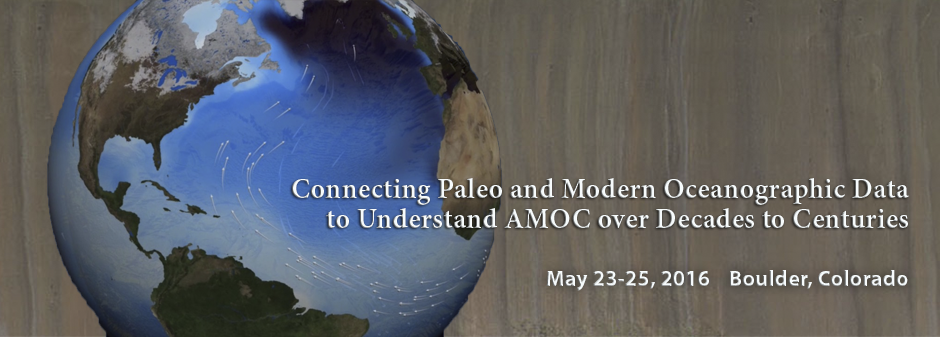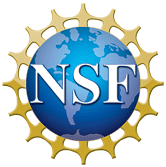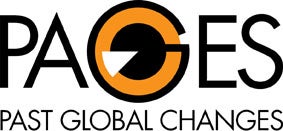2016 Paleo AMOC Workshop
Objectives
Motivation for this workshop began with the recognition that instrumental records are insufficient to study the multidecadal variability of Atlantic Meridional Overturning Circulation (AMOC), and a strengthened collaboration between the physical oceanography and the paleoceanography communities is needed to further AMOC research.
We aim to combine the expertise of both the modern and paleoceanographic communities to explore the state of knowledge of AMOC over a range of timescales. A main goal will be to identify promising, potentially synergistic research directions to improve our understanding of AMOC and its relationship to climate variability. Major challenges we will focus on are: understanding decadal to century scale variations of the AMOC, variations on these timescales during recent millennia, the history of AMOC changes during the Holocene, the mechanisms driving AMOC variability and changes, and the global and regional scale AMOC impacts. We hope to spark new research ideas across the disciplinary divide and promote new collaborations and cooperative research among participants. Potential questions for breakout and discussion sessions include:
AMOC State and Variability
- At what timescale does the coherence/incoherence in different parts of the AMOC flow impact observations and how does that change where AMOC should be monitored?
- Where are the key regions to focus on AMOC reconstructions/observations and how does that change with a target timescale?
- What are the pros and cons of alternative observing systems used for reconstructing AMOC before intense monitoring began in 2004 – including instrumental data, reanalysis, and biogeochemical observations?
- How can we leverage the different strengths of various AMOC observation/reconstruction methods and locations to better characterize AMOC variability over decades to centuries?
- What AMOC fingerprints can be used to reconstruct past AMOC variability?
AMOC Mechanisms and Predictability
- What metrics can be used to characterize AMOC that are relevant to mechanistic and prediction studies?
- Are we lacking anything to conduct effective paleo data-model comparisons, if so, what steps can we take to fill the gaps?
- What are the potential forcing factors of AMOC on these timescales and how can/do we use paleo archives to reconstruct those key variables?
- What is the relationship between AMOC and Atlantic sea surface temperature anomalies?
AMOC Impacts on Climate, Ecosystems, and Biogeochemistry
- What can paleo-data tell us about the impacts of AMOC variability on carbon cycling? What are the connections to the Southern Hemisphere?
- How does AMOC variability influence tropical and extra tropical hydrology/atmospheric circulation and how do those influences differ over different timescales?
- What are the potential feedbacks between AMOC and land/sea ice?
Participants
The meeting is open to the international science community interested in contributing to the discussion but is limited to approximately 60 attendees.
Format
A few invited speakers will give talks, but most presentations at the meeting will be via poster sessions to encourage interactive discussions of current research. Poster presentations will be advertised via one-slide, 2-minute mini-talks before the poster sessions. All attendees will be encouraged to submit an abstract to present a poster. The findings and recommendations made in the breakout groups will be disseminated to the wider scientific community in a workshop report and a review paper put together by a subset of workshop participants who are interested in participating in post-meeting writing assignments.
Scientific Organizing Committee
Hali Kilbourne (Chair), University of Maryland Center for Environmental Science
Ian Hall, Cardiff University, UK
Patrick Heimbach, University of Texas at Austin
Delia Oppo, Woods Hole Oceanographic Institution
Andreas Schmittner, Oregon State University
Rong Zhang, NOAA Geophysical Fluid Dynamics Laboratory
Program Organizing Committee
Mike Patterson, US CLIVAR
Jill Reisdorf, University Corporation for Atmospheric Research
Kristan Uhlenbrock, US CLIVAR
Sponsors
This is a joint workshop funded by US CLIVAR, NSF Marine Geology and Geophysics Program, and PAGES.



